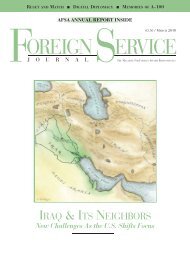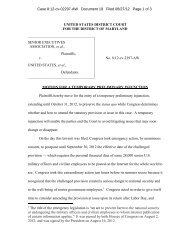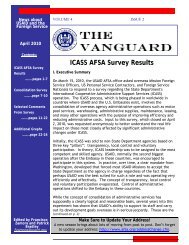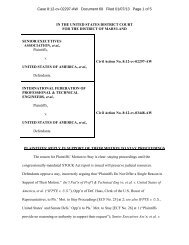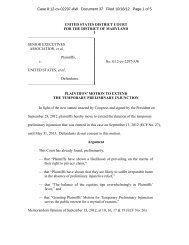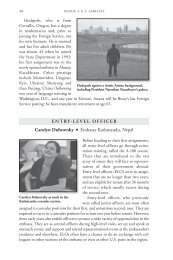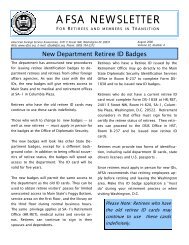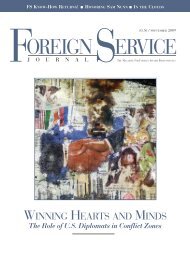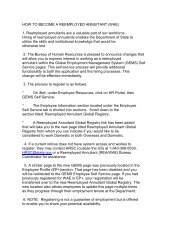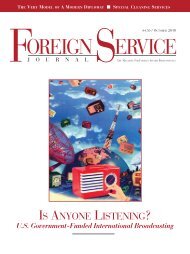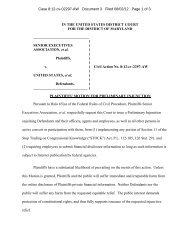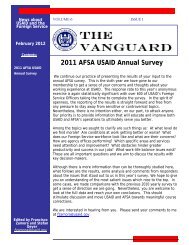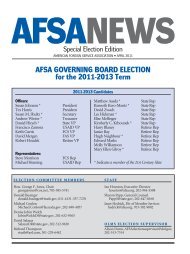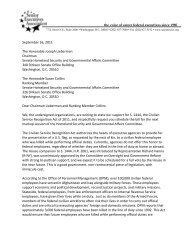F OCUS - American Foreign Service Association
F OCUS - American Foreign Service Association
F OCUS - American Foreign Service Association
Create successful ePaper yourself
Turn your PDF publications into a flip-book with our unique Google optimized e-Paper software.
A<br />
F<br />
S<br />
A<br />
N<br />
E<br />
W<br />
S<br />
V.P. VOICE: RETIREE ■ BY ROBERT W. “BILL” FARRAND<br />
Laws Can Change;<br />
So Can Your Benefits<br />
Lost in thought as I crawled in traffic behind a D.C. city bus, my eyes came to<br />
rest on an advertisement plastered across its back panel: “Laws can change.<br />
So can your pension. Join the National <strong>Association</strong> of Retired Federal Employees.”<br />
As the words sunk in, I snapped out of my reverie. The point was clear: we<br />
need to be reminded of just how vulnerable retirement benefits could become in<br />
these tough economic times. While I do not believe pensions will be significantly<br />
affected, I do think other benefits might come under pressure as our government<br />
looks for ways to trim costs.<br />
AFSA is the only organization devoted to looking after the benefits<br />
and rights of <strong>Foreign</strong> <strong>Service</strong> members and their families, and its<br />
strength flows from numbers.<br />
When I talk to the roughly 7,000 <strong>Foreign</strong> <strong>Service</strong> annuitants who are not<br />
AFSA members, I explain that AFSA is the only organization devoted to looking<br />
after the benefits and rights of <strong>Foreign</strong> <strong>Service</strong> members and their families, and<br />
that its strength flows from numbers. This is what impels AFSA to work with organizations<br />
like NARFE, the Military Officers <strong>Association</strong> of America, and a federation<br />
of dozens of similar organizations known as the FAIR Coalition. By<br />
combining resources, we can stay abreast of legislative changes that might adversely<br />
affect member interests. Our objective is to protect members’ (and nonmembers’)<br />
backs by being alert to threats to retiree benefits, as well as to<br />
opportunities for improving those benefits.<br />
Incidentally, I just renewed my NARFE membership.<br />
In other retiree news,AFSA is proactively engaging with the State Department’s<br />
new management. One retiree issue that has long been an AFSA priority is to remove<br />
the restrictions on folks serving under the category of “While Actually Employed,”<br />
to enable the State Department to use longer — and less disruptive —<br />
deployments of skilled and experienced <strong>Foreign</strong> <strong>Service</strong> retirees. We now hope to<br />
make real strides in removing the caps on hours and salaries, just as retired military<br />
officers have been able to do. Ideally, too, we hope to see administration of<br />
the WAE process centralized in a manner that will make it more equitable and<br />
transparent.<br />
Finally, I want to thank all of you who responded to my last column seeking<br />
ideas on how to reach the hundreds of <strong>Foreign</strong> <strong>Service</strong> annuitants who are not<br />
AFSA members. You may be assured that Hank Cohen, Janice Bay, David Passage,<br />
Jonathan Sperling and I took your many suggestions and ideas into account<br />
as we honed our strategy for pursuing this elusive cohort of prospective members.<br />
❏<br />
HERE COMES THE CAVALRY<br />
Re-employed<br />
Annuitants<br />
BY BONNIE BROWN,<br />
RETIREE COORDINATOR<br />
Because of salary and hours limitations,<br />
re-employed annuitants<br />
cannot be used effectively to reduce<br />
the current shortfall in department<br />
personnel or to provide continuity during<br />
the period in which a hoped-for<br />
surge of new <strong>Foreign</strong> <strong>Service</strong> personnel is<br />
identified and trained.<br />
As a result, department bureaus have<br />
turned increasingly to contractors who<br />
are not subject to these limitations — despite<br />
the fact that contractors cost twice<br />
as much as re-employed annuitants.<br />
The current <strong>Foreign</strong> <strong>Service</strong>, at<br />
11,300 members, is not adequate to carry<br />
out the department’s foreign policy<br />
functions. At present there is a 15-percent<br />
shortfall in needed mid-level personnel<br />
in embassies and consulates<br />
abroad, as well as in the department.<br />
This shortfall will increase with expanding<br />
global responsibilities and challenges.<br />
The department’s permanent work<br />
force is augmented by about 1,300 to<br />
1,500 re-employed annuitants (known<br />
as “While Actually Employed”) — over<br />
10 percent of the total.<br />
Although WAEs have the training,<br />
skills and experience to step into positions<br />
in the department and at posts<br />
abroad, the department is hobbled in its<br />
ability to use them. The <strong>Foreign</strong> <strong>Service</strong><br />
Act limits the amount of salary a WAE<br />
may receive in a calendar year, and Civil<br />
<strong>Service</strong> provisions limit the number of<br />
hours a WAE may work in an appointment<br />
year. This means that a typical reemployed<br />
annuitant can work no more<br />
than three to four months a year.<br />
In recent years, legislation has given<br />
the department authority on a case-bycase<br />
basis to waive one or both caps for<br />
certain purposes, such as passport processing<br />
and service in Iraq and Afghanistan.<br />
However, the scope and duration<br />
of this authority have been limited.<br />
The National Defense Authorization<br />
Act of 2004 provides a model for remov-<br />
42 F O R E I G N S E R V I C E J O U R N A L / A P R I L 2 0 0 9



